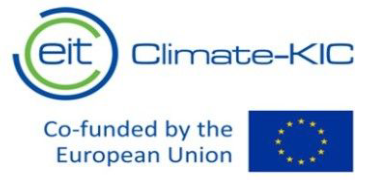Climate City Dash 2.0
09/01/2024 - 08/31/2026
Research area Transformative governance in cities and regions | Dr. Rick Hölsgens | Jürgen Dieter Schultze | Lana Fassbender | Ruben Nogues Kollert
The cities Dortmund, Heidelberg and Munich set themselves the goal to become climate neutral by 2035. To achieve this goal, actors within the city need to be enabled to, in collaborative settings, develop an effective portfolio of measures. Climate City Dash 2.0 creates effective, data-based governance process, supported with user friendly climate dashboards.
The Climate City Dash 2.0 pilot project is part of the NetZeroCities platform, which aims to advance the European Union Green Deal. NetZeroCities is designed to support cities in overcoming the current structural, institutional and cultural hurdles that prevent them from achieving climate neutrality by 2030.
Beyond pure data availability and access, greenhouse gas inventories and science-based target setting and monitoring the impacts of climate actions, face face numerous challenges and obstacles at the local level. Firstly, greenhouse gas inventories and ex-post monitoring of climate actions suffer from a multi-year lag, meaning that impacts become visible too late to monitor, assess and learn in time ahead of policy cycles and scientific research. Second, ex-ante assessments and impact assessments are often inconsistent, based on different plans, papers and studies, and are difficult to understand holistically.
In order to effectively assess local climate protection measures, an accessible and holistic theory of change and a clear, accessible data framework are essential. This is what makes effective action orientation on the way to the city's climate neutrality possible. Making the logic of the city's objectives, scenarios and impact pathways as well as the relevant emissions (direct indicator) and activity data (indirect indicator) accessible and comprehensible is an important step in the city's efforts to understand the system. The project is working in four work packages to set up appropriate climate dashboards in the participating cities, incorporating the results of stakeholder dialogues.
- City of Munich (Consortium lead)
- City of Dortmund
- City of Heidelberg
- Hochschule München
- TU Dortmund
- UnternehmerTUM
- Climate View
Creation of data-driven tranformation processes, based on co-creation methodology
The project comprises four areas of work that are closely interlinked:
Work Package 1: - Coordination, Monitoring, Evaluation and Learning (MEL)
This WP organizes and coordinates the overall project among all project partners and fosters mutual learning across Dortmund, Heidelberg and Munich. It also prepares aggregated deliverables on good practice and lessons learned, ready to be shared with and replicated by other Mission Cities across Europe.
Work Package 2: - Iterative Dashboard Set-Up and Development
This WP ensures the iterative development of Data Dashboards as a backbone for governance in Dortmund, Heidelberg and Munich, based on a phased approach: Data Entry, Dashboard design and Stakeholder-based Enhancement.
Work Package 3: - Stakeholder Engagement and Data Governance Process
In this work package, Dortmund, Heidelberg and Munich will map and engage stakeholders in a well-prepared, systematic and iterative data governance process. Key target groups are civil society and private sector businesses. Additional stakeholders such governmental departments, public companies, academic institutions and the general public will be included at the digression of each city based on the identified local stakeholder ecosystem. The final outputs will be an enhanced Climate Data Dashboard and a corresponding portfolio of proposed climate action, co-designed by all stakeholders.
Work Package 4: - Capacity Development for Data Governance, Project Preparation and Finance
This work Package serves to capacitate and empower local government, business and civil society actors to work with dashboards and use data governance for climate action, and turn their new knowledge into action. Participants will be fully empowered to use the cities data dashboard and leverage all available project preparation support on local and EU level to turn ideas into implementation projects, seek funding and financing and engage in professional project management and monitoring.




![[Translate to English:] [Translate to English:]](/storages/zentraler_bilderpool/_processed_/a/f/csm_Kontakt_b86e8d8ecc.png)
![[Translate to English:] [Translate to English:]](/storages/sfs-sowi/_processed_/6/c/csm_Glasfront_sfs_Header_eae6d325d3.jpg)

